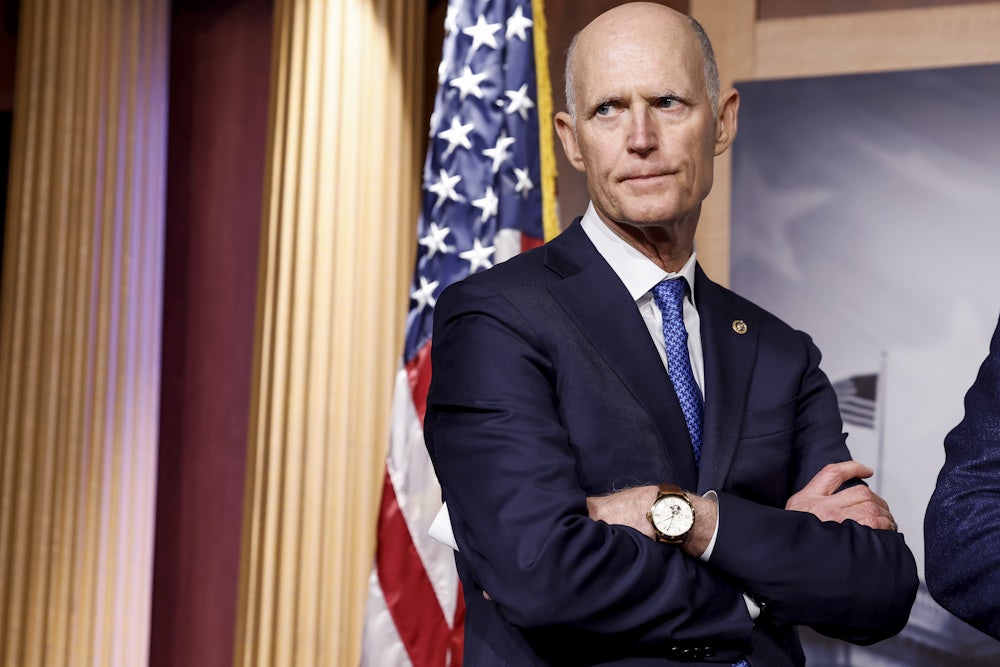A partisan standoff is underway in Washington over whether Congress will raise the nation’s debt limit to fund the government’s existing credit obligations, by how much to raise it, and under what conditions.
Republicans face a nonbinding statutory deadline of April 15 to release their budget, but by all accounts, they’re weeks or even months away from finalizing the details. They insist they won’t touch popular entitlement programs like Medicare and Social Security, but protecting social safety net programs is a relatively new position for the GOP. Last June, the 176-member Republican Study Committee, or RSC, published a plan that would raise the eligibility age for Medicare—the equivalent of a cut. As the largest subgroup within the House GOP conference, the RSC holds tremendous sway, and its leaders have risen to the highest echelons in Republican politics.
This wasn’t the first time the RSC had proposed overhauling entitlements. In 2005, the RSC called for $200 billion in cuts to Medicare while raising premiums in its 2005 budget proposal, when then–RSC Chairman Mike Pence led the charge to privatize Social Security.
“Conservatives want to see personal retirement accounts that have immediate relevance to younger Americans, that they can see the value, and that will require that they be big and that they be implemented in the final bill without delay,” said Pence at the time. That proposal ultimately failed as Democrats pilloried the Republican plan, which was deeply unpopular.
In 2019, Donald Trump’s budget proposal called for slashing Medicare, Medicaid, and Social Security. Trump’s deputy budget director at the time was Russell Vought, now the House GOP’s debt limit consigliere. Vought worked his way up to budget director, then executive director at the RSC between 2004 and 2008.
So the question is: Are House Republicans’ pledges not to touch entitlements for real, or is Vought influencing them otherwise?
“I’ve met with him,” said Senator Rick Scott of Vought. “He’s very knowledgeable about the budget. He’s got a 501(c)(3) or whatever. They put out a plan to balance the budget.” Vought’s nonprofit—the Center for Renewing America, launched in January 2021—has a roster of disgraced conspiracy theorists from Trumpworld on staff (Jeff Clark, Kash Patel, Ken Cuccinelli). Its 104-page budget proposal is backed by the House Freedom Caucus.
For his part, Vought has attempted to gut Social Security and Medicare in the past, both at the RSC in 2005 and at OMB in 2019. Moreover, with Vought advising the House Freedom Caucus, Medicaid is almost certain to come into the crosshairs for cuts during the debt limit fight, a move that would undermine entitlements for millions of seniors and poor people who rely on the program for their health care needs.
“The same former Trump official writing the MAGA Republican playbook for manufacturing a default crisis has been at the center of right-wing schemes to gut Social Security and Medicare benefits going back decades,” said Liz Zelnick, an advocate at Accountable.US. “His deep involvement shows the MAGA majority has no intention of letting the nation pay its bills until seniors and working families have less health and retirement security than before.”
During Vought’s time as Trump’s budget director, the federal deficit exploded by $1 trillion during his first year and $4 trillion in the second. Despite the historic spending spree during his time as OMB director, Congressman Chip Roy, a member of the far-right House Freedom Caucus, defended Vought’s track record as a fiscal conservative.
“Look, Russ didn’t pass the $2 trillion Cares Act,” said the Texas Republican who voted against the pandemic stimulus Trump signed into law in December 2020. Instead, Roy blamed Dr. Anthony Fauci, Trump’s chief medical adviser, for pressuring the administration into supporting the bill.
“Russ has his views,” said Representative Byron Donalds, whose stock rose in the House GOP conference after Roy nominated the two-term Florida Republican as House speaker in January. “We’re not even looking at Social Security and Medicare with respect to the debt ceiling,” Donalds continued. “We’re looking at our discretionary spending and then some policy adjustments.”
For his part, Vought proposed $150 million in budget cuts, but failed to provide specific accounting of those cuts. “We’re very consistent with Russ on what we could do to reduce the overall bureaucratic state and get defense where it needs to be,” said Chip Roy.
Despite reassurances from the GOP, some Democrats aren’t convinced entitlements are safe. “I have nightmares that the Republicans want to screw people in this country,” said Representative Jim McGovern, a Massachusetts Democrat and ranking member on the powerful House Rules Committee. “Not only do I worry about Social Security and Medicare, I worry about SNAP. They talk about cutting back on the program and increasing hunger in this country.”
Over 41 million Americans—roughly 12 percent of the country—receive benefits from the Supplemental Nutrition Assistance Program, or SNAP, including many red states residents, like in Alabama where 15 percent of the state’s residents receive benefits.
Representative Katie Porter, a California Democrat running for Senate, is less concerned than McGovern that Republicans will touch popular entitlements for seniors. “I think the early and strong public outpouring to members across the country, Republican and Democrat, made it really clear that Americans want us to be financially responsible, but not on the back of safety net lifeline programs for our seniors,” Porter said.
Failing to raise the debt ceiling would lead to a default on the nation’s existing credit obligations. Experts say such a default would be catastrophic. In 2011, a prolonged fight over the debt limit led to a downgrade in the nation’s credit rating.
Unlike previous squabbles over the full faith and credit of the United States, this year’s debt ceiling fight is being defined by the razor-thin margins for the GOP majority in the House where Speaker Kevin McCarthy has 222 Republican votes to Democrats’ 213. “I don’t see how we get there. And this is a marked change from where I’ve been,” House Financial Services Committee Chair Patrick McHenry told Punchbowl News. “I don’t even see a path [to a debt ceiling agreement].”
Since Congress left for a two-week recess on March 30, negotiations around the debt ceiling have continued to collapse among House Republicans. Speaker McCarthy has reportedly been critical of House Majority Leader Steve Scalise and Budget Committee Chairman Jodey Arrington, both key players in any legislation to address the debt limit.
House Republicans facing tough reelection bids have begun to express their frustrations with McCarthy as fundamentally unserious GOP firebrands—like Representatives Jim Comer on the Oversight Committee and Jim Jordan on the Judiciary Committee—leverage their chairmanships to do little more than shitposting.
As the House GOP’s outright dysfunction under McCarthy’s leadership continues to spill into the public sphere, there are whispers of motions to vacate the speakership when Congress returns to Capitol Hill. During McCarthy’s long, embarrassing election as House speaker in January, the California Republican agreed to drop the threshold for introducing motions to vacate the speakership to just one member. This means that any member of Congress with a bone to pick with McCarthy can take the first step to remove him from power.
Compounding the debt limit negotiations with a motion to vacate McCarthy as speaker could amount to the sum of all fears for budget watchers—with Republicans casting out their party’s hyperpartisan conductor whilst driving the full faith and credit of the U.S. off a cliff.
Maybe that’s why it’s taking so long for the House GOP to release a budget proposal. With no needle to thread on the debt limit, all McCarthy can do is hope that propagating conspiracy theories and culture-war bogeymen will distract voters from his ineptitude as a dealmaker.






